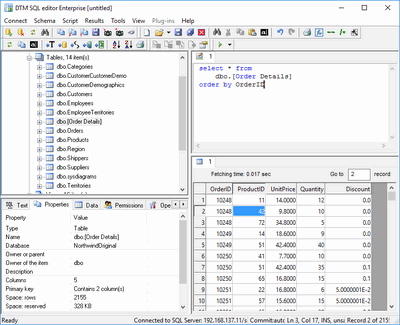How to use DTM SQL editor with DB2 Databases
DTM SQL editor is a set of tools for IBM DB2 users who works with SQL scenarios. The tool offers script editor with multilevel undo/redo, schema navigation and management tools, reporting tools for schema and row sets and SQL statement builder. The important advantage of DTM SQL editor is multivendor environment support. The user allowed working with DB2 Servers and another database like Interbase or MySQL from the common point of view i.e. the tool has a workplace with connection switching by one click.
Download free demo version right now!
Key Features
- The tool supports all common database interfaces (ODBC, IDAPI, and OLE DB) with detailed information about the data source.
- Tree-view for database schema and grid-view for SQL statement or scripts execution results. The multiple results set feature.
- Easy access to the history of the opened files and executed statements and scripts.
- The editor provides customizable syntax highlighting, multilevel Undo/Redo features, plug-ins support and search/replace tools and supports predefined and user-defined macros.
- One-click export tools for most popular desktop formats: plain text, HTML page, XML document and Microsoft Excel spreadsheet.
- The results of the execution can be saved as a set of SQL statements (INSERT).
- Query builder provides users with a fast way to create complex statements.
Why DTM SQL editor is suitable for DB2 users?
- Extended support for DB2-specific data types: LONG VARCHAR, BIGINT, TIMESTAMP, DATALINK, etc.
- The customizable user interface makes the work more productive: comment/uncomment feature, bookmarks, etc.
- Built-in database structure utilities: navigation, export, snapshot operations, object search.
- Script editor makes the work with script easy and comfortable: block operations, drag-n-drop features.
- Entity-relationships (ER) model viewer with export feature.
- Rich property viewer shows detailed information about currently selected database item: table, trigger, index or view.
- SQL Library helps to optimize SQL scripts storing.
- Version control systems and other third party tools integration via plug-ins support.
See Also
- About demo version
Related Tools
Form Based Data Editor
